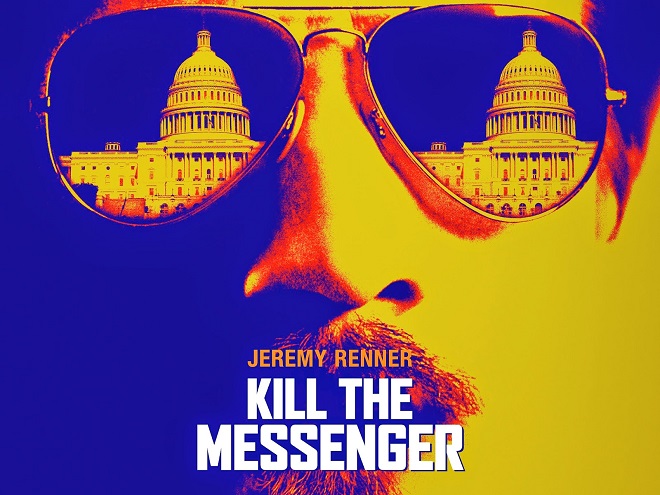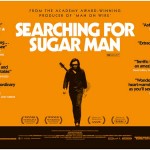“Kill The Messenger” is a movie telling two stories. First it is the story of how the Central Intelligence Agency facilitated cocaine sales in our country in the 1980’s so that the proceeds from those sales, at one point reaching a total of $3 million per day, could be used to illegally fund rebel fighters in Nicaragua, all done with the complicity of the Reagan administration, a presidency which double downed on Nixon’s War on Drugs. And secondly, this movie tells the story of the reporter who did the most work in uncovering these ties, and who was subsequently discredited by the mainstream media, apparently acting on behalf of the government. So basically this is the feel good movie of the year.
In “Kill The Messenger,” Gary Webb (Jeremy Renner) is working at the San Jose Mercury News, and coming off the success of his most recent published story regarding civil forfeiture, someone contacted him out of the blue with a tall tale so tall it just had to be true, and this was a story involving drug dealers in cahoots with the US government. Webb meets this person, who gives him a name and sends him down a rabbit hole that went so deep there was no hope of ever coming back out. Webb goes around asking questions, dropping names, and before long, he is visiting a jailed drug kingpin in South America and he’s finding out way more information than he ever hoped to find, information that tied the US government to the crack cocaine epidemic of the inner cities of America, with Los Angeles being ground zero.
Webb is warned numerous times along the way about the possible, and some said inevitable, pitfalls of publishing such a story in the press, and some of these warnings come from a place of friendliness and concern while the other warnings come in a more confrontational and aggressive form, and as Webb comes closer and closer to the time the story gets published, the menace and paranoia kick in, and the movie gets a little heavy in portraying Webb as a person putting himself and his family in danger. And then after the story is published and there is a quick victory lap, the shit starts to hit the fan, as Webb starts getting torn apart by the bigger newspapers, namely The Washington Post, the Los Angeles Times and the New York Times, all of whom seem very eager to call Webb’s work shoddy and to call him incompetent. As the pressure mounts and the CIA steps in to make Webb’s sources flip their stories (or just outright disappear), Webb is discredited publicly and he continues to try to put the last of the details together while also trying to maintain a grip of his personal and professional lives.
In an honorable effort to show Gary Webb as a fully realized character, an actual human being and all that and not just “a reporter” or an excuse to get into the scandal itself, much attention is paid to Webb’s relationship with his family and most specifically with his wife and his oldest son. The problem with this is that, I guess in an attempt to keep the movie from getting too long (it has a run time of just under two hours), we don’t actually get into enough details regarding the aftermath of Webb’s publication of his series. We are told here and there about how people are reacting to the public takedowns of his work ethic and character, but Webb tries not to let this stuff bother him, leaning on his belief that he wrote the truth, an unassailable truth at that, and that the facts and history would bear him out. As a consequence, there are many scenes of people telling Webb about the imminent consequences with Webb just brushing most of them aside and doing his best to roll with the punches, which includes a reassignment to a newspaper desk in Cupertino, where nothing happens. We keep being told this stuff is dangerous, and then Webb mostly acts like he’s not in much danger.
And then his family problems, while admirable, are nowhere near as interesting as the story he reported on and the fallout from that. I wanted to see more of the CIA and their reactions to the story and the media’s continued reaction and what they were subsequently consumed by (the Clinton-Lewinsky scandal) instead of taking Webb’s story at its own value. And I definitely wanted less of Webb confessing his past sins to his son while he cries and says he’s disappointed in his father. Also I wanted less of Webb’s wife (Rosemarie DeWitt) being distant and unsure of her husband, and just more Webb doing his job and dealing with the ensuing shitstorm.
If they wanted to tell both of these stories, both Webb’s personal life as well as the writing and publishing of his “Dark Alliance” series, they needed to go long, go ahead and make this a two and a half to three hour epic story, and go even deeper into the years after Webb was discredited, instead of just wrapping up the story with a couple of title cards at the end interspersed with some real life news footage from the time period. This could have been a really heavy, epic, hard hitting and ultimately tragic telling of a dark part of our country’s very recent history, a history that has implications still being felt throughout the country to this day, but instead it comes across as a little light, at least considering the heavy subject matter.
There are a couple of things I found amusing about “Kill The Messenger.” First off, this is the type of movie that has a great cast but in which everyone shows up for one scenes, maybe two tops. Paz Vega gets two or three small scenes, Ray Liotta, Robert Patrick and Andy Garcia all get one scene each, and Michael K. Williams and Michael Sheen get two scenes each (Williams doesn’t even speak in the second scene and Sheen’s face is mostly hidden during his second scene), and Tim Blake Nelson and Barry Pepper get about three scenes each. It is kind of weird actually to see so many capable and watchable actors come into this movie quickly, only to very quickly exit it and never be seen or heard from again. Another funny motif I noticed in this movie is the habit of having characters talking to Webb on the telephone and having them end a conversation by telling Webb what to do, like “Enjoy your family” or “Be careful,” and then hang up on his immediately afterwards to get him off the phone. That happens at least three times in this movie.
Also there is this moment when Webb is at a real low point and he got some seriously bad news on the phone and he steps outside for some fresh air just to find out that his motorcycle was stolen and he really flips out and punches the window out of his own car and he really gets upset about the bike getting jacked, but honestly I couldn’t tell if the bike was stolen by the shadowy government people following him around for some unexplained reason (just to fuck with him?) or if the bike being stolen was just another bad thing to happen to him on a very bad day, resulting in him finally snapping and letting all his frustrations out? Kind of a strange thing to have be a big emotional moment.
And finally there is a scene in which they are playing a Pearl Jam song, and considering this movie takes place in 1996, this makes sense, but the problem is I am pretty sure this Pearl Jam song was written and released after the 1990s. I haven’t been able to confirm the exact song used in the movie but it definitely does NOT sound like 90s Pearl Jam. Kinda weird. They could have used any number of well known PJ songs from that time period. Oh well.
So “Kill The Messenger” is okay, definitely filled with enough passion and righteous anger to make the US-Contra drug ring scandal really pop, because hell, that IS a big deal after all, but then again there is a sense of being helpless when it comes to hearing this story because it happened almost twenty years ago and we live now in a day and age in which government corruption and scandal is nothing new and really no secret programs or illicit behavior on their part can really be all that surprising anymore. It kind of feels like “Kill The Messenger” is preaching to the choir. Yeah, we know our government is kinda fucked. So what do you want us to do about it anyway? We get it.


 Bonus Episode – Oscar Picks 2017
Bonus Episode – Oscar Picks 2017 2014 Florida Film Festival preview
2014 Florida Film Festival preview Review: ‘Searching for Sugar Man’
Review: ‘Searching for Sugar Man’ Review: ‘Ender’s Game’
Review: ‘Ender’s Game’
Leave a Reply
You must be logged in to post a comment.